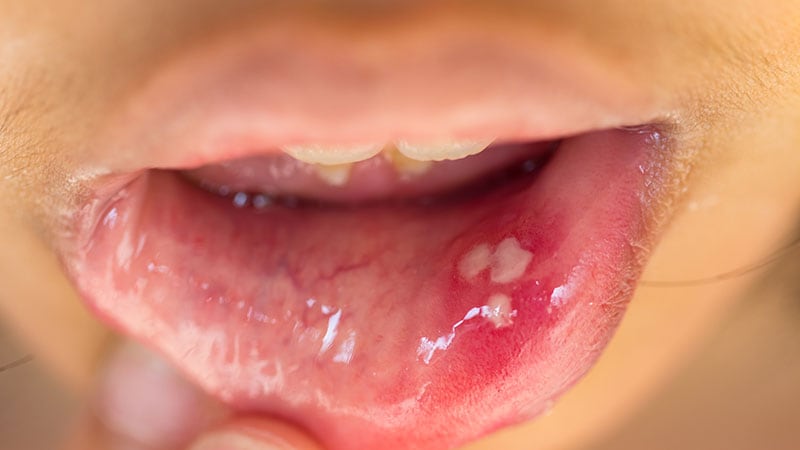Use of the mTOR inhibitor everolimus in the treatment of postmenopausal HR+/HER2– metastatic breast cancer can be hampered by the development of stomatitis/mouth ulcers, which can lead to dose reductions and discontinuations.
A new approach of slowly escalating the dose of everolimus reduces the risk of this adverse event, say a group of German researchers.
Instead of initiating treatment the usual way at the full 10 mg/day dose, they tried dose escalation. Women were initially treated with 2.5 mg/day the first week; 5 mg/day the second week; 7.5 mg/day for week 3; and then the full dose starting at week 4. Everolimus was given with the aromatase inhibitor exemestane, a common combination for the treatment of this disease.
Women who received everolimus with this slow dose escalation were at less risk of developing mouth ulcers than those who were initially given the full dose.
“A dose-escalation schema of everolimus over 3 weeks can be successfully implemented to reduce the incidence of high-grade stomatitis in the first 12 weeks of treatment. This could be an alternative strategy for reduction of everolimus-related stomatitis as the use of a steroid-based mouthwash has a small but real risk of developing oral candidiasis,” say investigators led by Prof Marcus Schmidt, an oncology professor at Johannes Gutenberg University in Mainz, Germany.
This “approach gives us a very safe and viable option to treat HR+ patients with everolimus and exemestane,” commented Jame Abraham, MD, chair of hematology and medical oncology at the Cleveland Clinic, Ohio. He was not involved in the study and was approached for comment by Medscape Medical News.
The study was published in the December issue of ESMO Open.
The new approach of slowly escalating the everolimus dose was compared to standard dosing in the DESIREE randomized clinical trial. The results show that the incidence of somatitis of grade 2 or higher during the first 3 months of therapy was 28.8% among the 80 women who underwent dose escalation, vs 46.1% among the 76 women who initially received 10 mg/day.
The discontinuation rate in the first 3 weeks was lower with dose escalation, at 6.3% vs 15.8% (P = .073).
Women in the dose-escalation group also received more of their medication ― 91.1% of the prescribed everolimus dose vs 80% of the prescribed dose in the 10-mg/day arm (P = .329).
The DESIREE study met its primary endpoint and demonstrated that a dose-escalation schema of everolimus over 3 weeks can be successfully implemented to reduce the incidence of high-grade stomatitis in the first 12 weeks of treatment, the authors write.
The reduction in stomatitis seen in this trial was comparable to some past reports regarding dexamethasone mouthwashes, but it was not quite as robust as described in other reports, they comment.
“As stomatitis is a common side-effect of targeted therapies for breast cancer, it may be worthwhile to investigate if the use of escalating dose regimens might improve the tolerability of other new targeted agents,” they add.
However, there is a wrinkle in the data.
More patients had progressive disease in the start-low group at 24 weeks. The difference was not statistically significant, note the authors, and might be partially explained by differences in the patient characteristics in the two groups. More women in the dose-escalation group had poor performance scores, and they also had more metastatic sites and more liver metastases.
However, “we cannot exclude a lower efficacy” in the escalation arm, the investigators caution.
“This is slightly concerning as it brings up the question of whether we lose precious time to control metastatic breast cancer by starting at lower doses to reduce the risk of stomatitis,” and further investigation is needed, said Siddhartha Yadav, MBBS, MD, a medical oncologist at the Mayo Clinic in Rochester, Minnesota. He was not involved in the study and was approached for comment.
The trial was funded by Novartis, maker of the branded everolimus product, Afinitor. Schmidt has consulted for and has received speaker’s fees, grants, and other payments from Novartis and other companies. Other co-authors also reported ties with Novartis.
ESMO Open. 2022 Dec 7:100601. Full text
M. Alexander Otto is a physician assistant with a master’s degree in medical science and a journalism degree from Newhouse. He is an award-winning medical journalist who worked for several major news outlets before joining Medscape. Alex is also an MIT Knight Science Journalism fellow. Email: aotto@mdedge.com.
For more news, follow Medscape on Facebook, Twitter, Instagram, and YouTube
Source: Read Full Article



